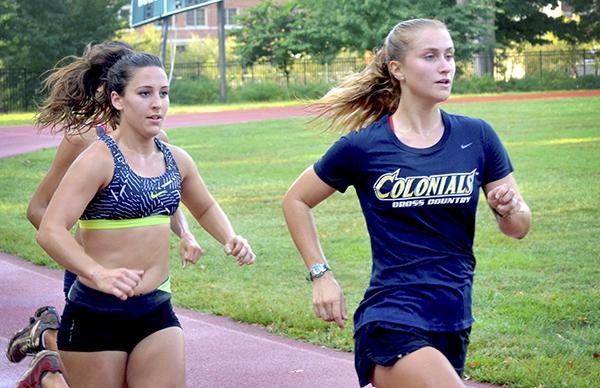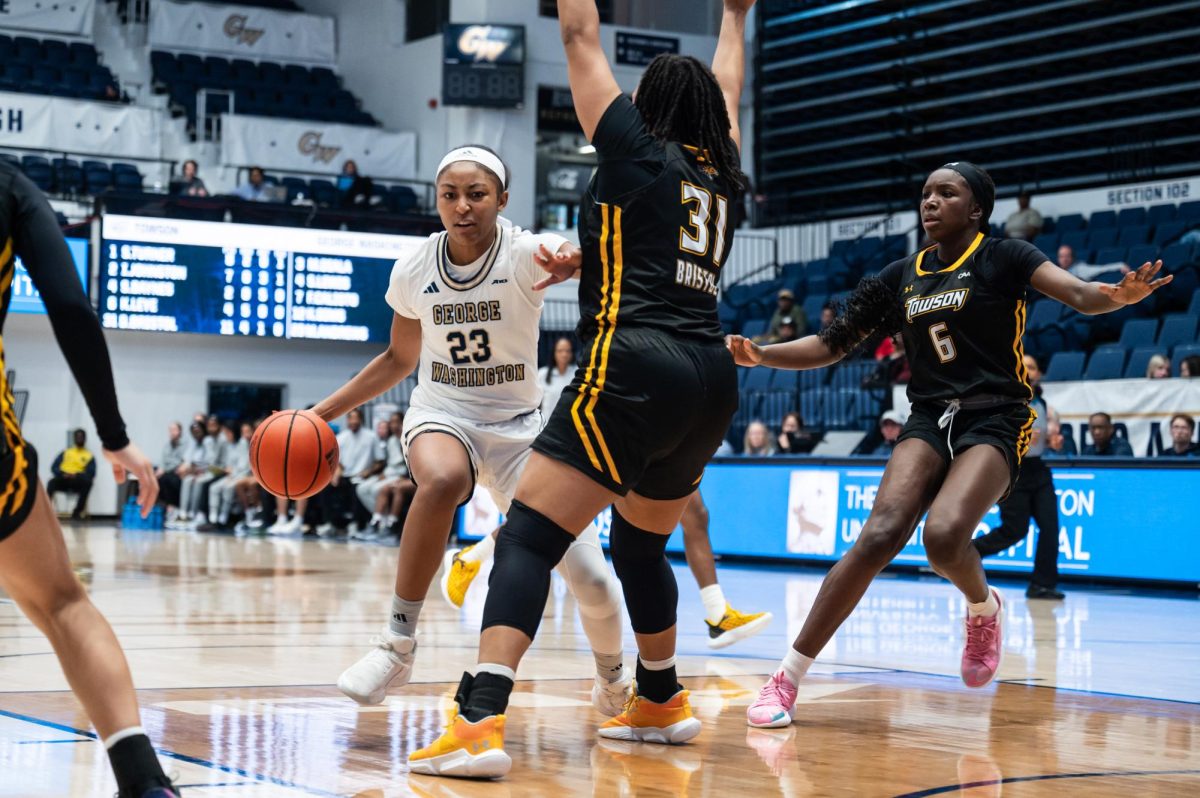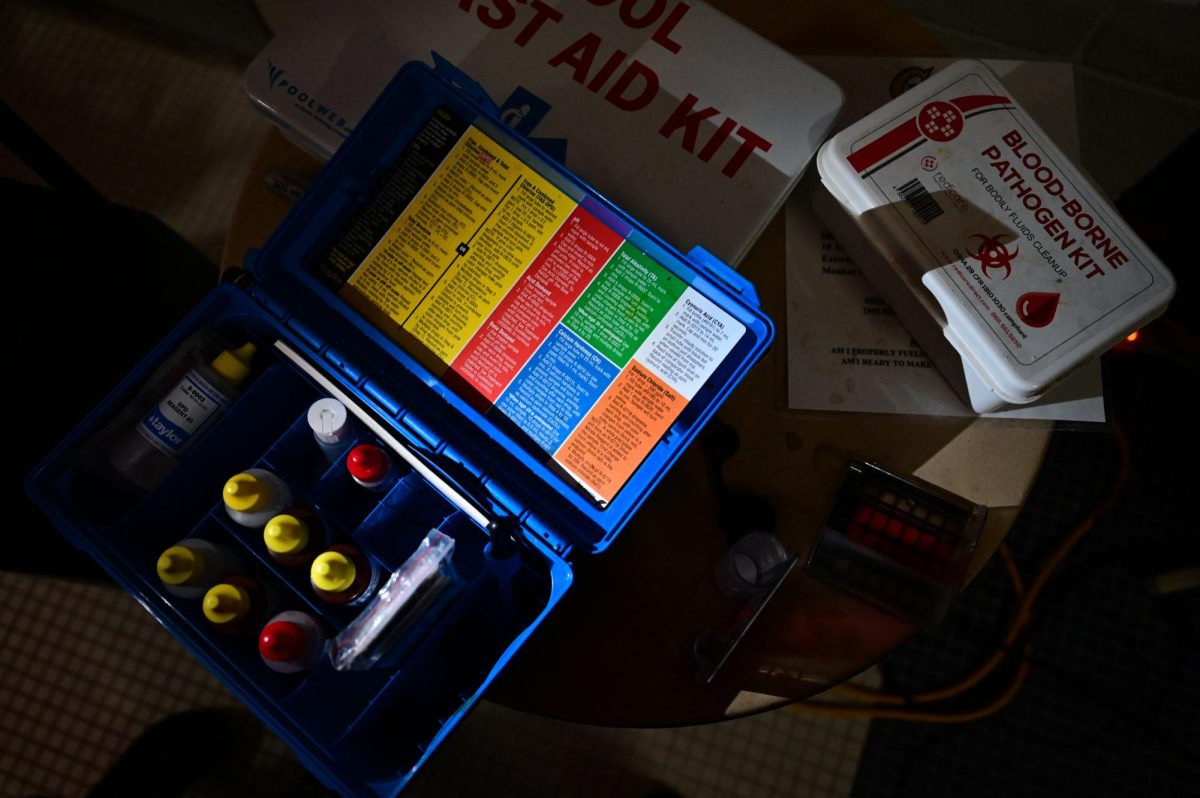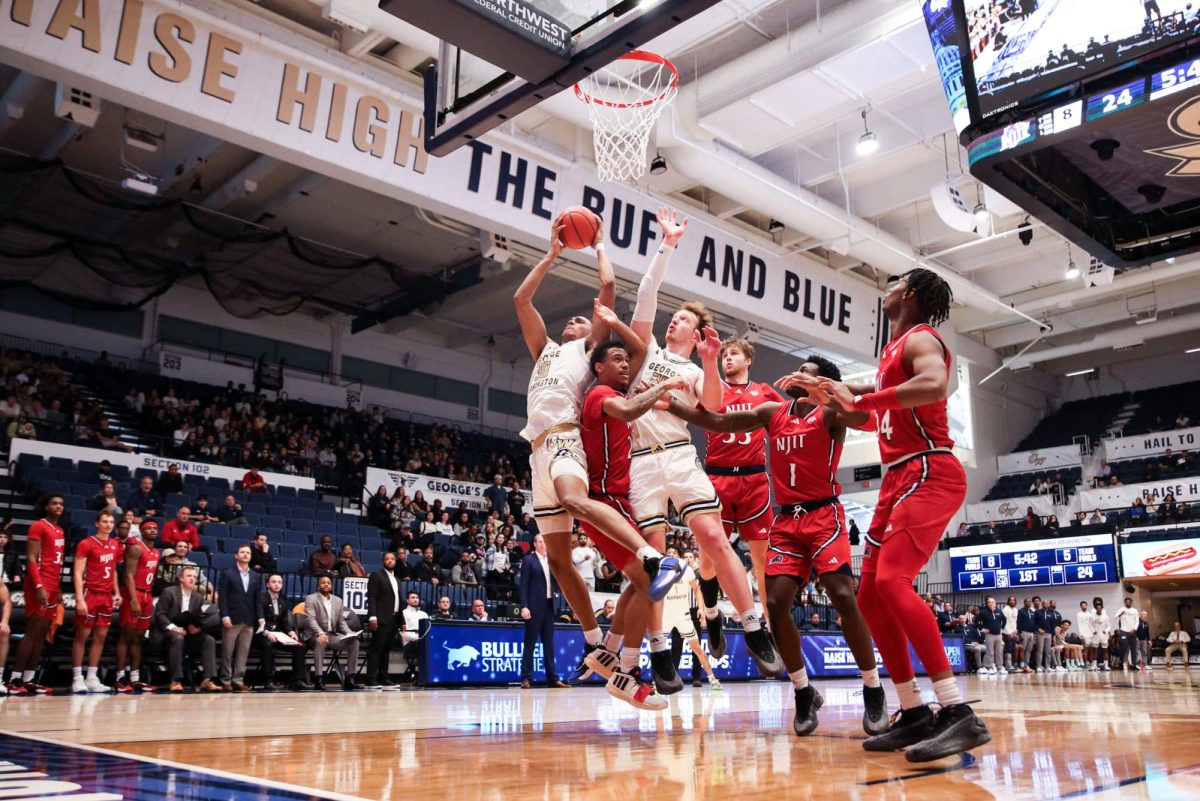On a September day when the humidity matched the heat, an old pug and his owner slowly trotted on a track toward a couple of coaches.
“Where are the old coaches?” the man asked.
Confused, cross country head coach Terry Weir and assistant coach Chelsea France humored the man. He was wondering where two former volunteer assistant coaches were.
“Max misses her,” he added.
The man did not recognize Weir or France as the coaches that they are and have been. Weir is in his fourth year at GW, France her second. The team practices on the Georgetown community track three times per week. At least the man only brought up Georgetown once.
Change has come fast for the program, though. Four years ago, nine women and 11 men marked the cross country rosters: two freshmen women and four freshmen men. When France joined the team last year, she barely recognized a photograph Weir showed her of that team.
“When I saw that picture of the original nine, it was definitely something that was surprising to me,” France said.
Now, the program lists 18 runners on the men’s roster and 28 on the women’s. A record 22 of those runners are new.
Weir, though, was quick to point out two freshmen from that 2012 group who helped him reach his dreams and are still with the team: Ryan Tucker and Caroline Wolfe.
“They took a chance on the vision I had for this program,” Weir said. “They’re the first ones to buy in on it.”
Tucker and Wolfe, now seniors, are the captains of their respective teams. The program has moved forward — gingerly, yes — with their head coach guiding them toward an eventual Atlantic 10 championship. It likely won’t happen this year, but, “Now, it’s just getting our next-generation runners to be better than our first ones,” Weir said.
“I feel really good about it because when Ryan and Caroline came here, they didn’t have a Ryan and Caroline,” he added.
Tucker and Wolfe came from New Jersey high schools and neither were sure they wanted to compete in college until late in their high school careers. Like many GW athletes, both were more concerned with where they went to class than where they went to practice. Both began their recruitment process with the previous head coach, then tagged along once Weir took over, enticed by the possibility of starting a track program.
Tucker had friends who ran for Weir at American University and vouched for him. Wolfe knew a member of the Colonials squad, Julia Weir (no relation) from high school, and she also gave the word of approval.
Tucker and Wolfe knew the pressure would be low, the immediate impact would be high and the team would be tight-knit.
“It was a small team when I started out, so we were super close,” Tucker said. “That sort of bond is still growing even though the team’s getting larger.”
The team ran in packs on a Thursday morning track workout. Tucker and fellow senior John-Louis Pane got a head start, and then the rest of the team started.
“Wow, I want to be that when I’m a senior,” freshman Connor James said after practice.
The underclassmen are in awe of Tucker’s speed and of his work ethic, but they all run together. When the practice was over, they all left together to jog the couple of miles back to campus.
In Tucker’s first years, he struggled to improve without anyone to run with. But as the program has developed, runners like Pane have gotten faster and Weir said that he finally has running partners for Tucker. It’s mostly Pane, but some underclassmen are catching up quickly.
“He could’ve gone up and left, and gone to a bigger, better program at the time,” Weir said. “But he didn’t. He stayed here.”
Unlike Tucker, Wolfe doesn’t run in front of most of her teammates. At the Salty Dog Invitational last weekend, she was the 11th fastest runner on the team. Seven runners will make up the A-team for the conference championship, and her goal is to just be a part of this group.
Despite new competition, Wolfe is already in better shape to reach that goal than ever before in her college years. Wolfe battled Achilles tendon problems as a freshman before getting a stress fracture in her femur as a sophomore. This meant miles upon miles spent cycling on a stationary bike, in lieu of practice with her teammates. At times quitting crossed her mind, particularly her freshmen year.
“When you see your whole team out there running and you go, ‘Well, I can’t do any of this. Why am I here?’” Wolfe said.
As a junior, she started to work her ways toward being healthy again. She remembers one practice when her senior teammate Erica Halvorson came up to her to say she was proud of Wolfe for showing up every day, and that it made Halvorson look up to her.
“That kind of made me feel good,” Wolfe said. “I’m here for a reason. I’m not just here to go to the bike. They genuinely see that I’m trying to get back into shape.”
Wolfe now has the chance to run her first fully healthy cross country season since high school. She’s looking forward to her best event, the 1500 in track, and to helping guide the team’s goals all year long.
That’s another change from her freshman year, she said. Back then, the team held goal-setting meetings, but they were more relaxed.
“We would just pick a spot and be like, ‘Oh, we could be seventh,’” she said. “Then we wouldn’t really touch back on it for a while.”
Now, the women’s team has higher expectations. After the Salty Dog Invitational, GW earned its second-ever regional ranking, and sophomore Miranda DiBiasio, who won the race, took home A-10 runner of the week honors. It’s all still a little surreal to Wolfe.
“I never thought my freshmen year that we would have 30 people on this team and I never thought I’d be the captain of 30 people,” Wolfe said.
Both teams are large now and that means dynamics will naturally change. For now, it is still an easy-going and tight-knit team — though don’t be late for practice, even by five minutes, because they’ll probably leave you behind. This first era is coming to a close for Weir, but under Tucker and Wolfe, he sees the necessary changes as the program grows.
“I’m not saying the captains we had when they first got in were bad, it was just a totally different focus, totally different team,” Weir said. “This is what I wanted and envisioned out of our captains.”







